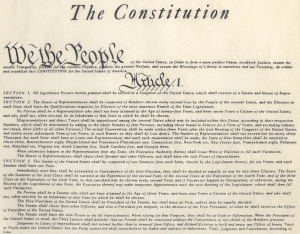One of my book clubs chose to read the U.S. Constitution a few months ago, inspired by Khizr Khan’s speech at the 2016 Democratic convention. This week seemed to be an appropriate time to look at it again. Regardless of your political leanings, if you are a U.S. citizen this is the foundational document and primary source for your country’s government.
I realise that one can spend years learning about all the interpretations and rulings that have added layer after layer to this short document. Some book club members read additional books to expand their understanding, but I wanted to start fresh here.
Some of us had read the Constitution back in our schooldays; others never had. I think we were all surprised by how much we’d forgotten or perhaps not noticed in the first place.
Of course, this week all eyes are on Article I, Section 9: the emoluments clause intended to ensure that our elected officials are not bribed by “any King, Prince, or foreign State.” We expect our elected officials to put the good of the country before their personal gain. You could argue that this possibility is already covered by the treason clause (Article III, Section 3), since accepting a bribe would also be putting another country’s interest before that of the U.S. and therefore giving them “Aid and Comfort.” Still, I’m glad it is spelled out.
The sentence just before that in Section 9 amused me: “No Title of Nobility shall be granted by the United States.” A few years ago I visited Sulgrave Manor in Oxfordshire, England, home of George Washington’s ancestors. One of the guides told me that a few days earlier a contingent of Daughters of the American Revolution (DAR) members had toured the house. These women had assured the guide that they were the aristocracy of the U.S. I said no, that was just their personal fantasy, and that I was sure they were not representative of the DAR as a whole. I added that my mother, who had been invited to join, had refused. Despite her interest and pride in her family history, she thought it was un-American to think yourself special because your family had been here since the revolution.
I was also surprised that there were only two casual mentions of Native Americans in the document. This was another headslap moment, though, because I certainly knew about tribal sovereignty. Tribal nations are considered “domestic dependent nations” whose relationship to the U.S. is different from that of a foreign nation. There are limitations on tribal nations’ sovereignty just as there are limitations on the sovereignty of states and the federal government.
Whatever else I’d forgotten, I remember the first ten amendments to the Constitution, also known as the Bill of Rights. I come back often to the first of them which assures freedom of religion, speech, and the press; and rights of assembly and petition. This one seems in most danger today.
Other amendments provide a curious glimpse into the country’s history, such as Amendment III against housing soldiers in people’s homes without their consent (except in case of war and then only according to law). This is not something most of us worry about today, but it was a big issue for the colonists.
And the U.S.’s shame is spelled out here as well. Why would amendments be needed to guarantee the right to vote regardless of race or color (Amendment XV) or gender (Amendment XIX)? Surely Amendment XIV should have been enough since it guarantees the civil rights of “All persons born or naturalized in the United States” and says that “No State shall make or enforce any law which shall abridge the privileges or immunities of citizens of the United States.” Thus we are reminded that there was a time not that long ago when people of color and women were not actually considered “persons”.
I’m glad my book club pushed me to reread the Constitution and reacquaint myself with this country’s first principles.
Have you read the Constitution recently?
